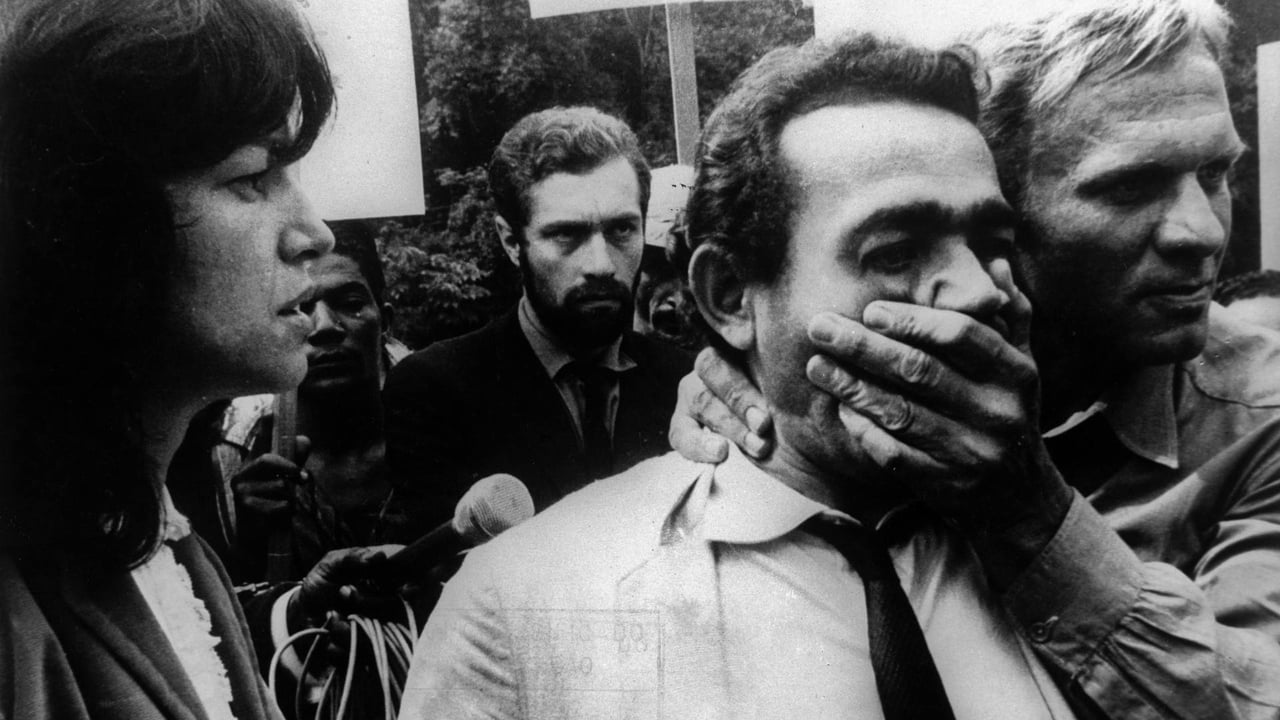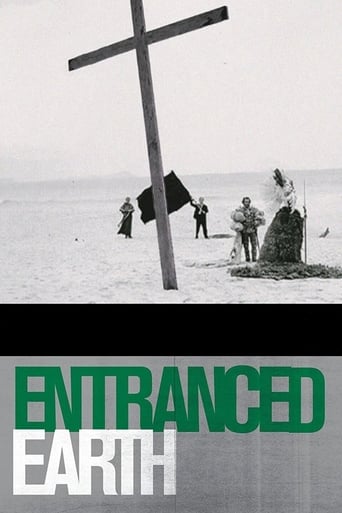ReaderKenka
Let's be realistic.
Helloturia
I have absolutely never seen anything like this movie before. You have to see this movie.
Janae Milner
Easily the biggest piece of Right wing non sense propaganda I ever saw.
Ricardo Daly
The story-telling is good with flashbacks.The film is both funny and heartbreaking. You smile in a scene and get a soulcrushing revelation in the next.
jgcorrea
This one is incredibly listed in the popular reference book ¨1001 Movies you should see before you die.¨ Eldorado was, of course, Brazil. Director Rocha had some talent, although no sense of humor, which might have helped him in this particular instance. Drama, after all, is simply a serious way of being comic and - like the Romans used to say - ¨castigat ridendo mores¨ - punishing morals via laughter. Ironically, however, Mr. Rocha anticipated in 1967 the Brazil of nowadays, 32 years after the end of a military dictatorship regime: as of 2017 Brazil is a true... land in trance... full of corruption , populism & Tartuffe-like characters! In Rocha's 'fictional' Eldorado country, political power was challenged by an idealist-anarchist journalist-poet who opposed two corrupt politicians: a populist governor and a conservative president (suitably named Porfirio Diaz!). There is nothing wrong with politics-fiction provided there is some good story and some sound plot. But this film is ultra-tiring, irritatingly breathtaking as a kaleidoscopic satire on treacherous dictators who delight in cavorting while their naif electorate helps them to reach power. Filmed in the freestyle of the French Nouvelle Vague, Twisted Earth is approximately a hot mess. Its hand-held camera kinematics made it impossible to understand exactly what was happening in its convoluted plot. In 2017, it is a kind of time capsule, no more than a dated experimental-subversive production article with a leftist vision that advocated the 1960's counter-cultural posture.
tomgillespie2002
Following his fascinating portrayal of outlaw Antonio das Mortes and the dying days of banditry, Black God, White Devil (1964), Brazilian director Glauber Rocha - only 28 at the time - made the dazzling, deliberately contradictory and admittedly plodding Entranced Earth, a kaleidoscopic satire of politics in Latin America and the mad dictators who seemed to delight their people only to oppress them once elected. Filmed with the free-styling vigour of the French New Wave, Entranced Earth is often exhausting but consistently breathtaking.Told through the eyes of poet and journalist Paulo Martins (Jardel Filho), we first encounter him pleading angrily with governor Felipe Vieira (Jose Lewgoy) to fight back in the midst of a social uprising against his administration. We flash back to learn that they were once friends, with Paulo offering his support during the election process, only to see the the promises Vieira campaigned on go out the window as the people go hungry. Vieira's political opponent, conservative Porfirio Diaz (Paulo Autran), was also once Paulo's friend, and has spent his life in luxury away from public view until a chance to rule turns him into a raving, yet highly charismatic, lunatic.Entranced Earth is quite a confusing film. It strides along shifting back-and-forth in time and between various characters, and the kinetic, in-your-face camera-work makes it difficult at times to decipher just what the hell is going on. As a time capsule and a piece of experimental film-making, it is fascinating and deserves to have each of its frames pulled apart and analysed. It's a leftist view that is without any overt political statements, and instead seems to set out to capture the political counter-culture of the 1960's (or the demise of it). By setting it in the fictional country of Eldorado, Glauber avoids commenting on any country in particular, but is clearly making a statement about Latin America. It may leave you confused and worn- out by the end, but it's political cinema with both an edge and a sense of humour, and takes its technical influences from the greats of world cinema.
Claudio Carvalho
In the hypothetical Latin-American country of Eldorado, the idealistic and anarchist poet and journalist Paulo Martins (Jardel Filho) fights against the populist governor, Felipe Vieira (José Lewgoy), and the conservative president Porfirio Diaz (Paulo Autran), supported by revolutionary forces. Paulo is depressed, since the two corrupt politicians were his former friends and have been elected with his moral support.In 2005, "Terra em Transe" is dated, and has a confused screenplay, although being magnificently updated regarding the lack of ethics and the amoral behavior of the politicians. If the reader has had the opportunity of reading Machiavelli's "The Prince", he or she will see how the behavior of politicians remains unchanged along the centuries. However, keeping in mind that this is a 1967 movie, and Brazil was under a tough military dictatorship, this movie is a milestone in the history of Brazilian New Cinema. Glauber Rocha was very braze, discussing forbidden themes such as fight of classes, manipulation of the submissive masses by the elites, corruption in politician, anarchism, campaign promises not kept after the elections, economical power of foreign groups (or countries) in Latin American countries and coup d'état. In 1967, "Terra em Transe" was awarded with "Great Prize" in the Locarno Festival (Switzerland); "Luis Buñuel Prize" in Cannes Festival; "Federation of International Critics Prize" in Cannes Festival; and Best Movie of the Year in the Air France Prize, among other prizes. My vote is eight.Title (Brazil): "Terra em Transe" ("Land in Anguish")
MR 17
Although this film is not so perfect as it is normally stated, it is a very important film neverthless. In Brazil, it's usually a case of "love it or hate it" as regards to this film. It may not be perfect, but it is impressive, and shows efficiently political corruption and the degradation of one's soul as well. Although somewhat confused in some moments, the film is packed with great scenes, and is always visually impressive. It also had the merit of discussing Brazil's problems at the time, using fictional "Eldorado" as a shield against the strong censorship applied in these days. Has it's place guaranteed in brazilian cinerama.

